This post is also available in:  Deutsch (German)
Deutsch (German)
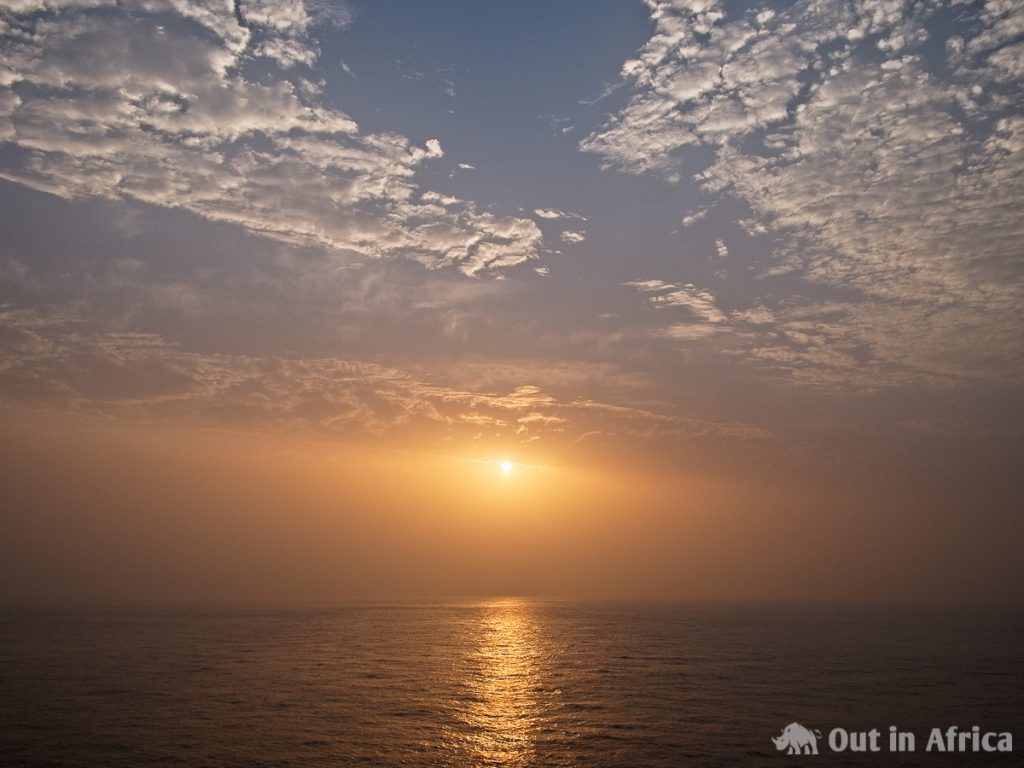
Hunting Flying Fish
The weather is perfect. A light wind comes from behind, the sun shines from a cloudless sky. The sea is very smooth. There are almost no waves. It’ not as smooth as in the movie “Life of Pi”, but that was computer animation anyway.
“Perfect weather for hunting flying fish,” says the captain. By that he means taking pictures. His wife, he and I walk forward. I take a bag with me. Inside is the second camera with the wide-angle lens, sun screen and a Coke. The captain carries a photo backpack with Nikon’s 500 mm telephoto lens.
The weather is perfect for photographing flying fish, if you master it.
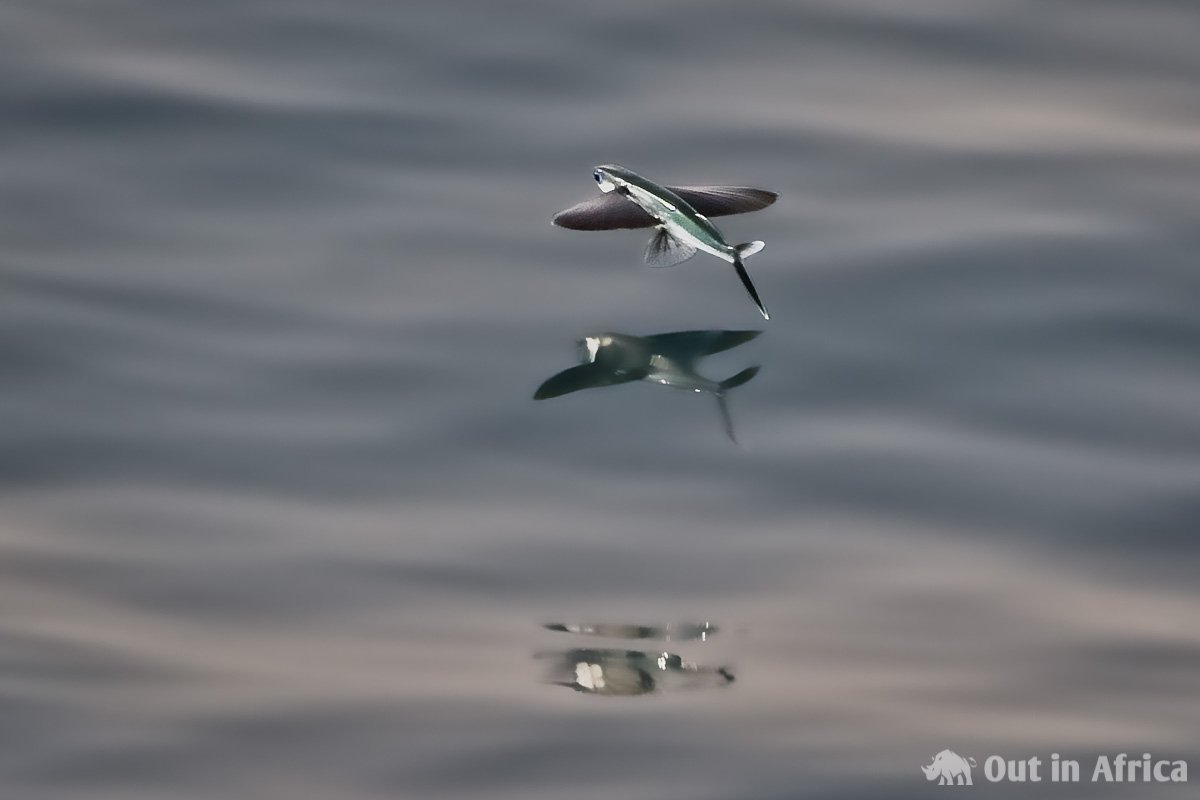
You have to imagine photographing flying fish like this: The fish are about the size of a herring. We photographers stand on a platform, higher than a ten-meter tower by the swimming pool. Everything moves: the waves and the water sway, the ship moves forward, the agile fish fly away from the ship. It is difficult to get the animals in front of the lens fast enough and then follow them.
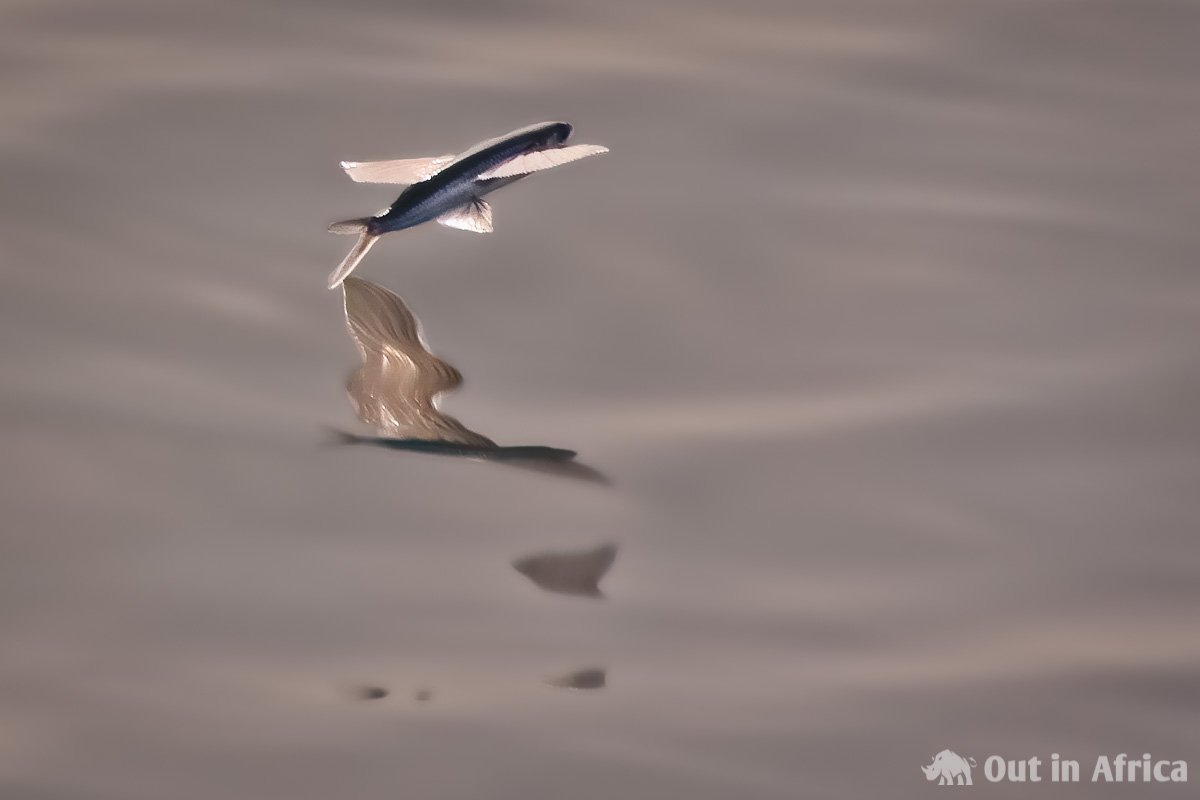
I only have a 300 mm telephoto lens. That’s enough for now. With this focal length I first have to learn to follow the fast fish at all. At the same time I have to focus and pull the trigger. I’m glad about the tip from the captain with the back button focus. It is also important that I can move my upper body freely. If I lean against the railing, I can’t get the camera up fast enough. Finally, I set the camera to Continuous Shooting. When I shoot, the camera takes several pictures in a row.
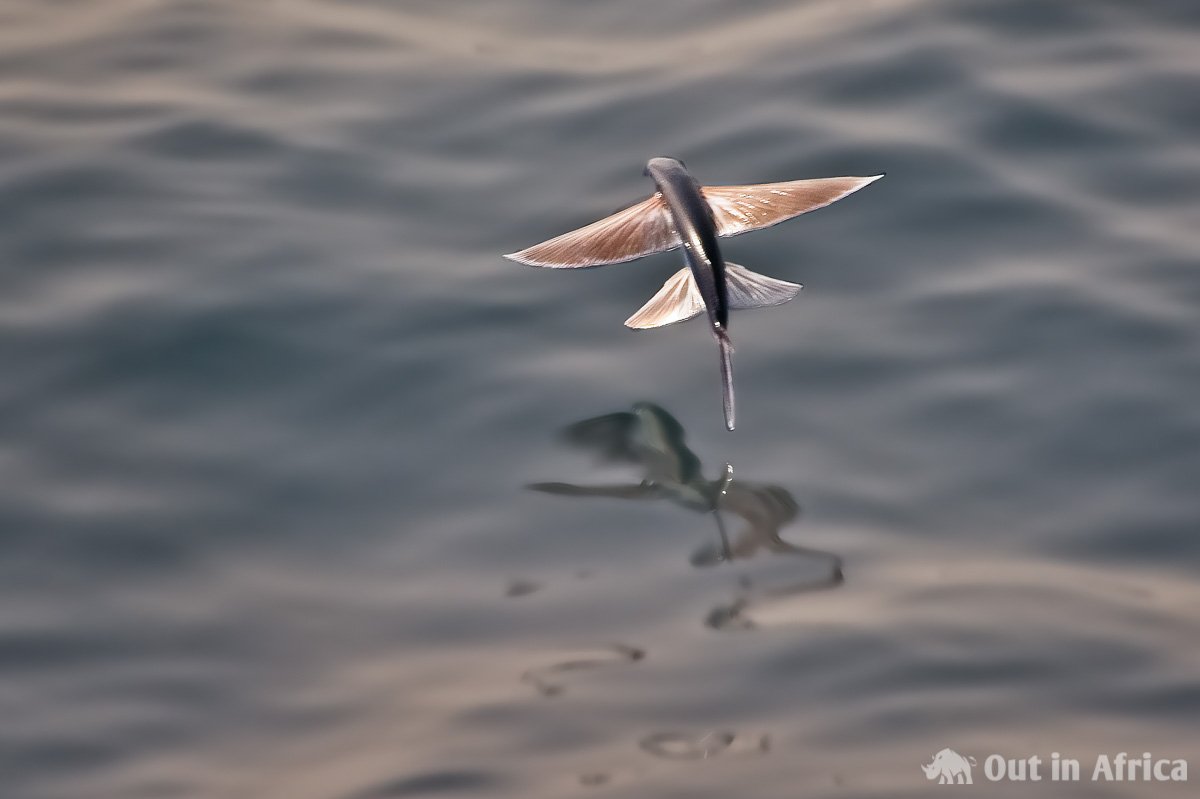
So when a flying fish emerges from the water, I pull the camera to my eye, aim, focus quickly and pull the trigger. Whack, whack, whack, whack, whack, splash! After five or six photos the fish disappears into the water again.
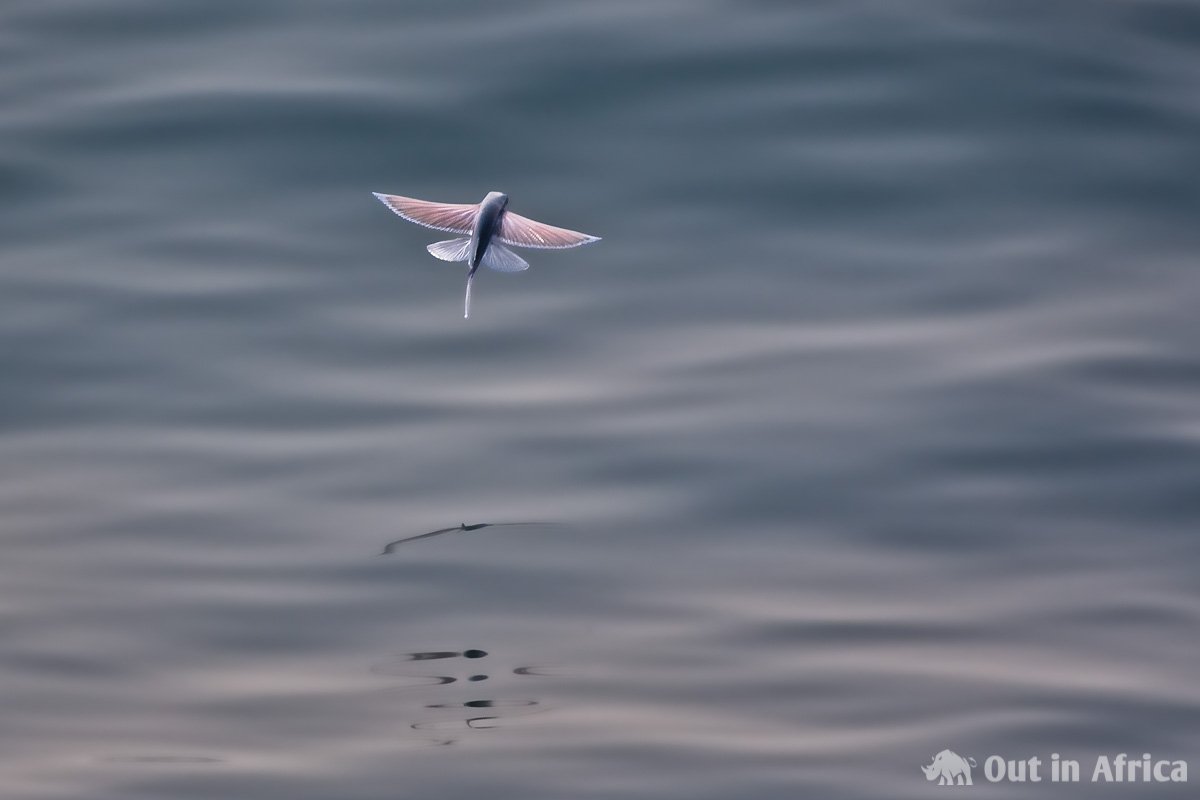
I didn’t know flying fish could glide that far. Often it is several hundred meters. Sometimes they “run” with their tail fins on the surface of the water to regain speed and thus buoyancy. Sometimes they fall down while running.
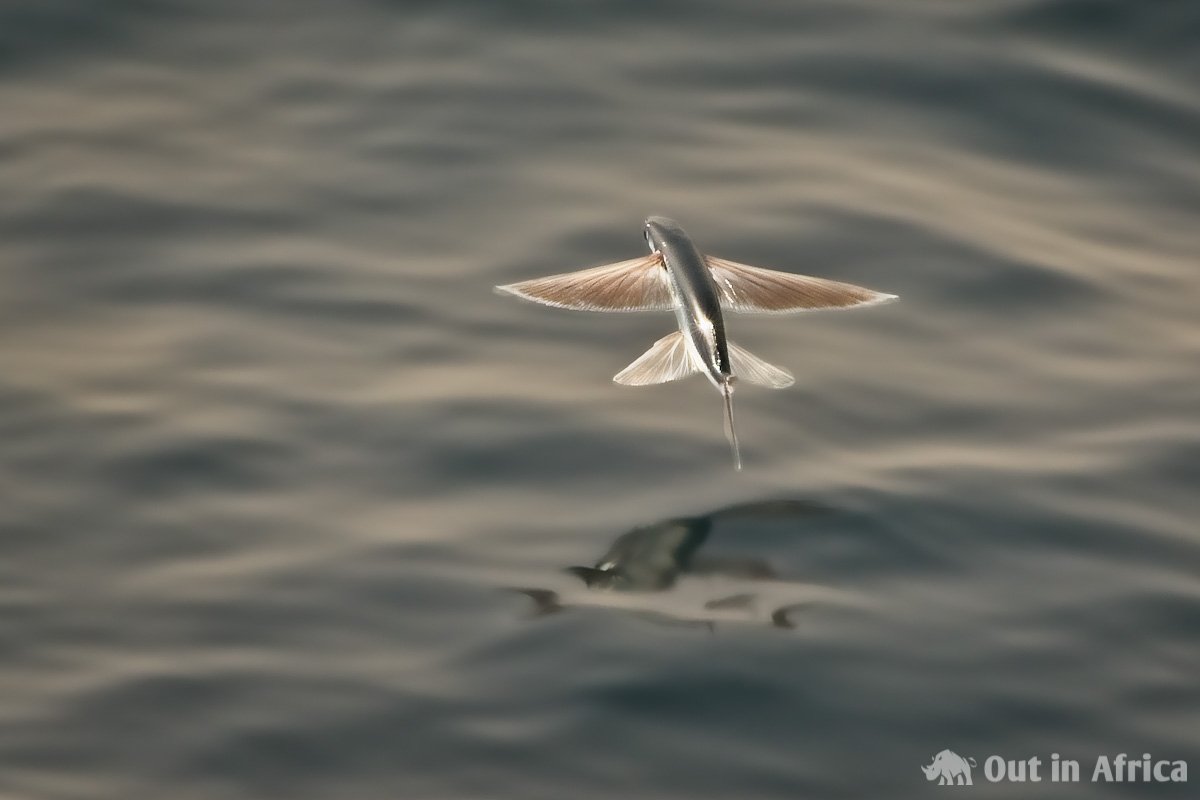
The flying fish are now like springboks in Etosha National Park. There are thousands of them. But they are perfect for training fast wildlife photography.
Slowly I get the hang of it and create some nice photos.
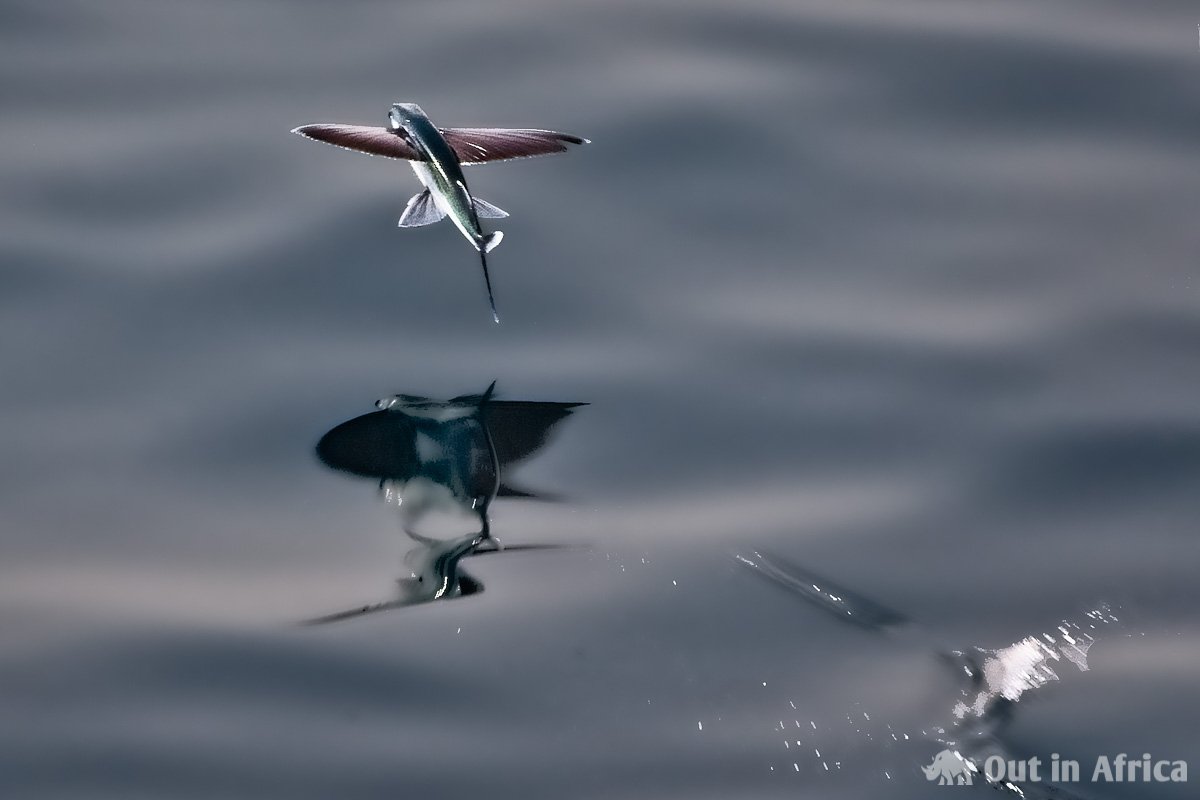
We stand on the balcony for hours. At the end I have almost 500 pictures in the camera. Most of them show only water.
In between, I raise my gaze to look further away. For photos everything over 100 m away is not well suited because of the haze on the water, but maybe there is something else than flying fish?
Once I see a huge dorsal fin in the water. “Shark,” I shout out loud. The captain manages to take a picture of the fin with his big lens. But he is sceptical whether it is a shark. The fin is much too big for an ordinary shark. That was more like a whale. Maybe an Orca?
Later, he looked in his field guides and compared his photo with the images of whale and shark fins. It is a shark, a Blue Shark. They are so big and they are at home in this part of the ocean. The shape of the fin fits. That’ s how I saw a Blue Shark.
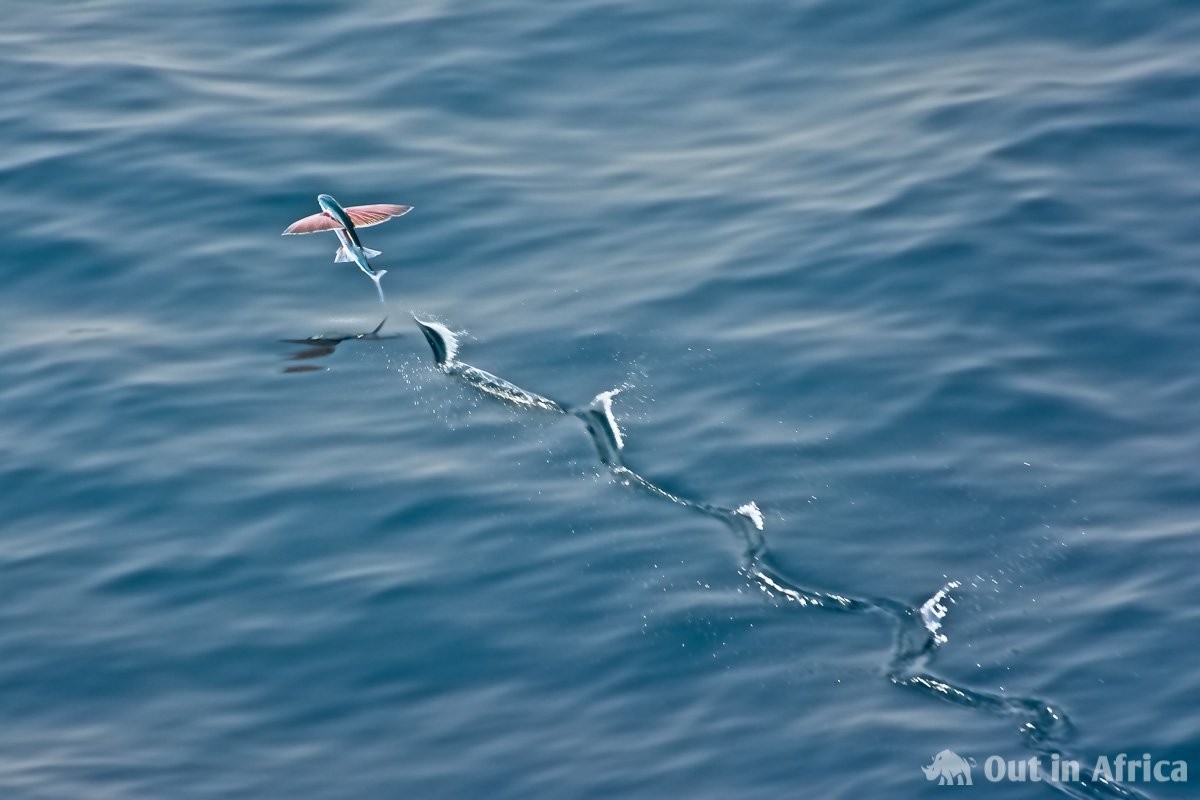
A little later the captain’s duties call him back to the bridge. His wife and he say goodbye.
Pierre arrives shortly afterwards. He already took some very nice photos of the flying fish in the morning. He is deservedly proud. But he is convinced that he can do even better. We go hunting for the flying fish again.
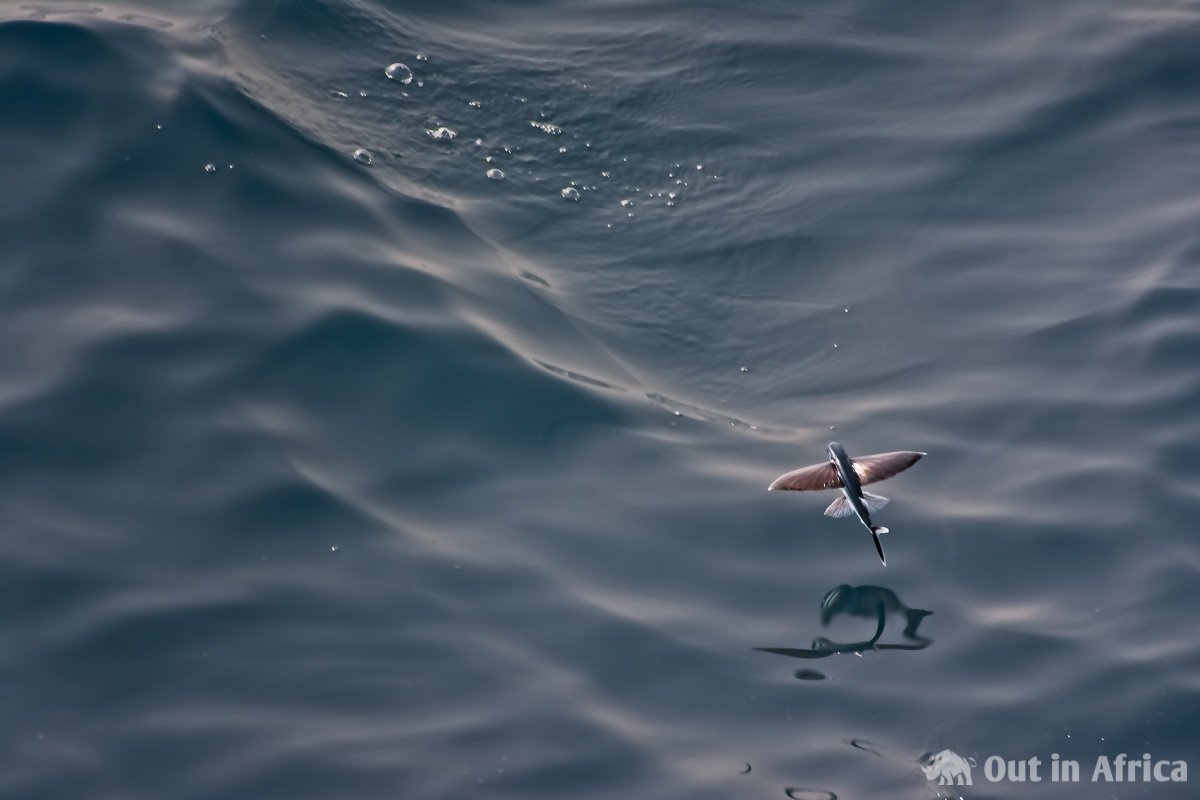
In between I look up again and look for fins of sharks or marine mammals. With the smooth sea it is relatively easy. I look for dark spots on the surface. In the meantime I have learned to distinguish wave crests from other things. In the far distance I see whales. They are the kind I saw the day before. Pierre says, these are the ones the Japanese hunt for “research purposes”. I have to take a look at the captain’s field guide.
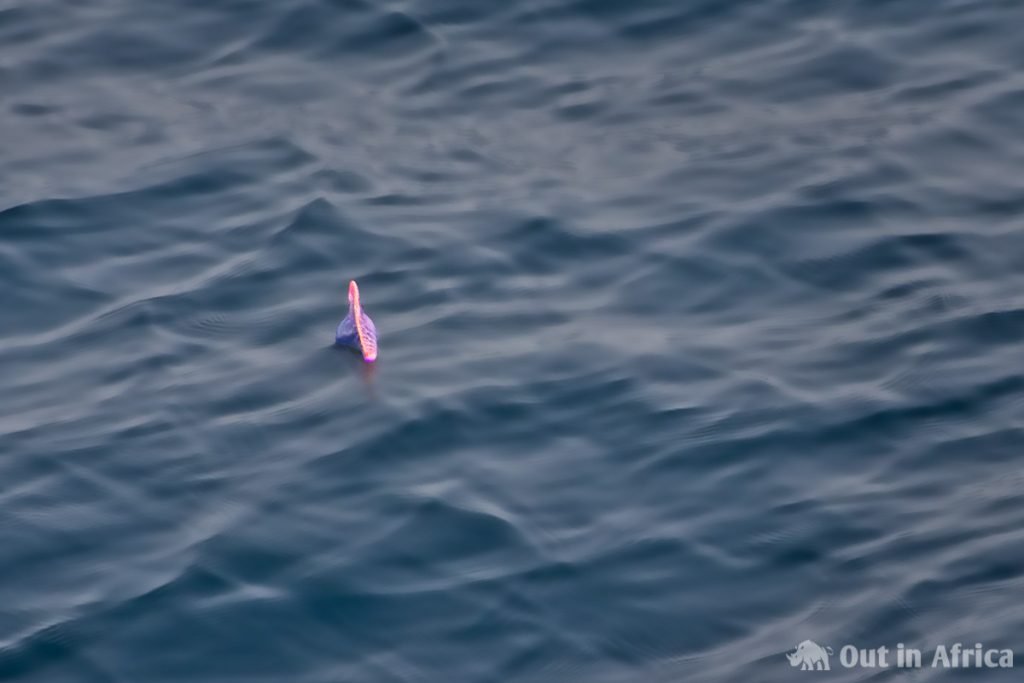
We often see a jellyfish. They are those that have a floating body filled with air, like the Portuguese man o’ war. But they are much bigger (I guess 20 to 30 cm) and have a yellow-orange colour with pink accents.
I have now spent four hours on the balcony. My one hand hurts from holding the lens, but hunting flying fish is still fun.
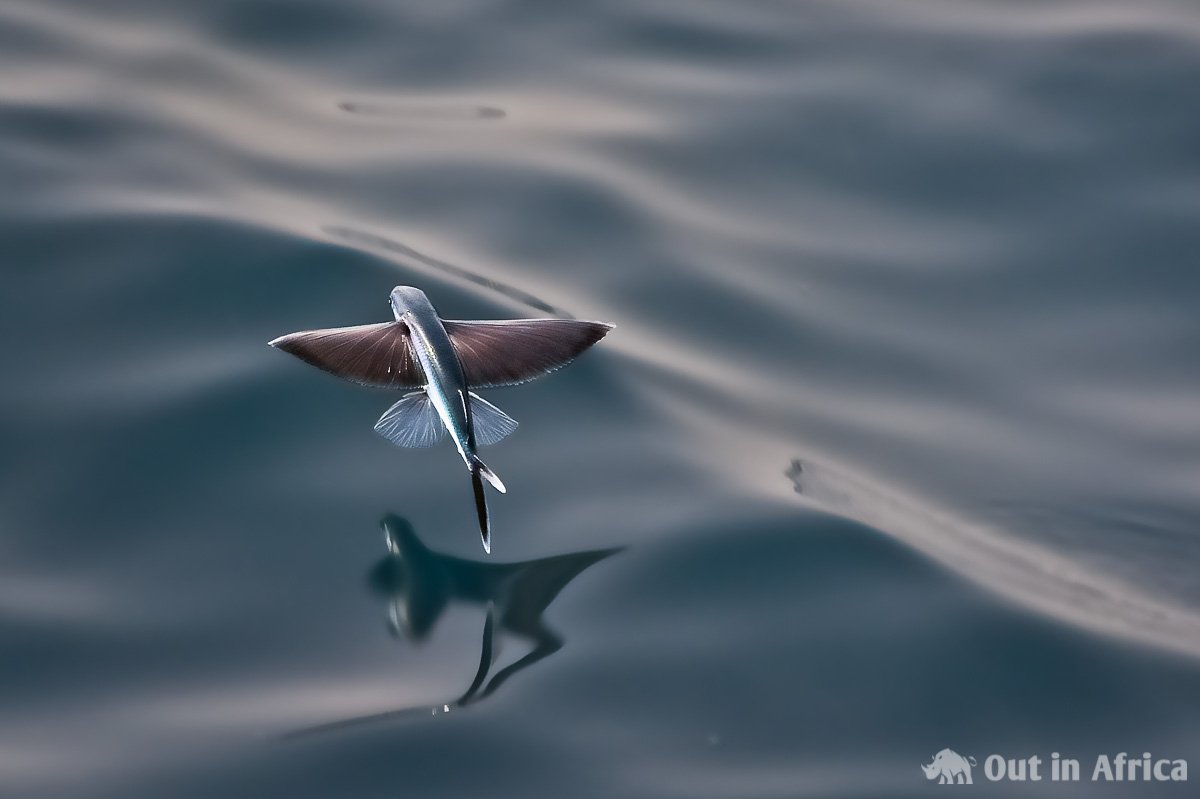
Abandon Ship
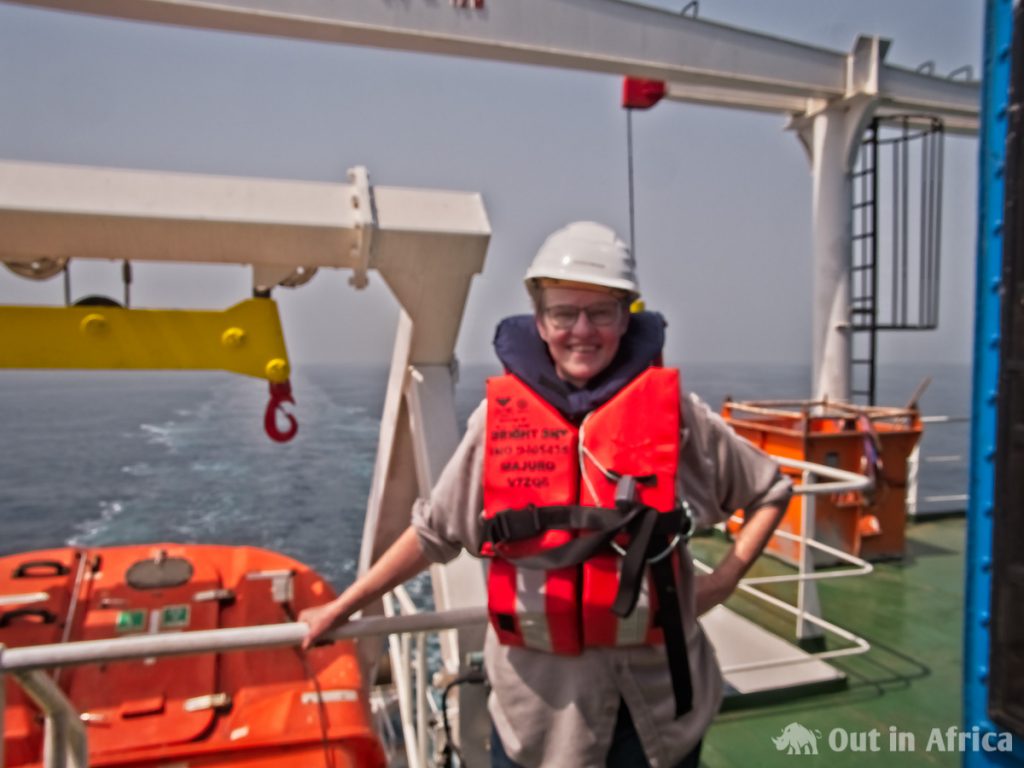
At 15:00, I go back to the cabin. An “Abandon Ship Drill” is announced for 15:20. When the alarm signal sounds, everyone goes on deck D to the “Muster Station”. This time we also have to take our rescue suits with us, but don’t have to put them on. The Third Officer checks to see if everyone is there.
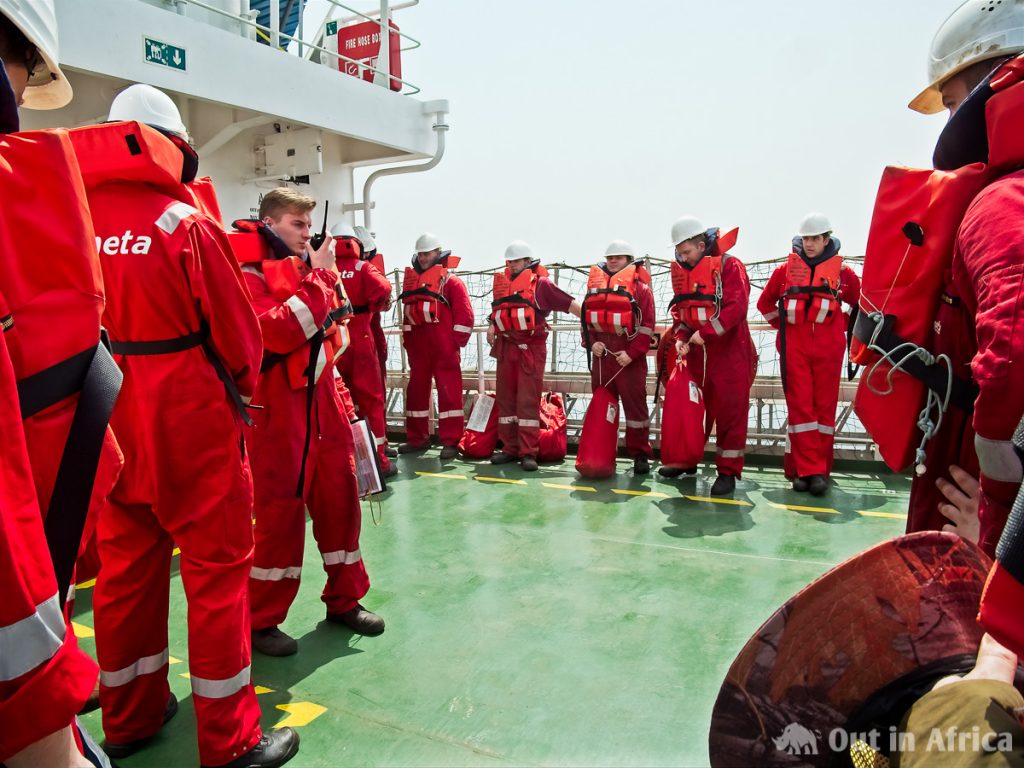
Next, the ship’s crew has to climb into the lifeboat. We passengers are excluded. The captain, who has to take care of the bridge at the moment, since all officers take part in the drill, observes everything from above. For once the cook is allowed to leave earlier, because he still has a lot to do for the barbecue in the evening. Pierre and I take photos.
The seamen take their seats in the lifeboat and fasten their seat belts. The purpose of the exercise is to ensure that everyone knows what to do when the vessel has to be abandoned. They should also get used to the claustrophobic conditions in the lifeboat. In a real emergency, leaving the ship would be stressful. Nobody wants anyone to be claustrophobic.
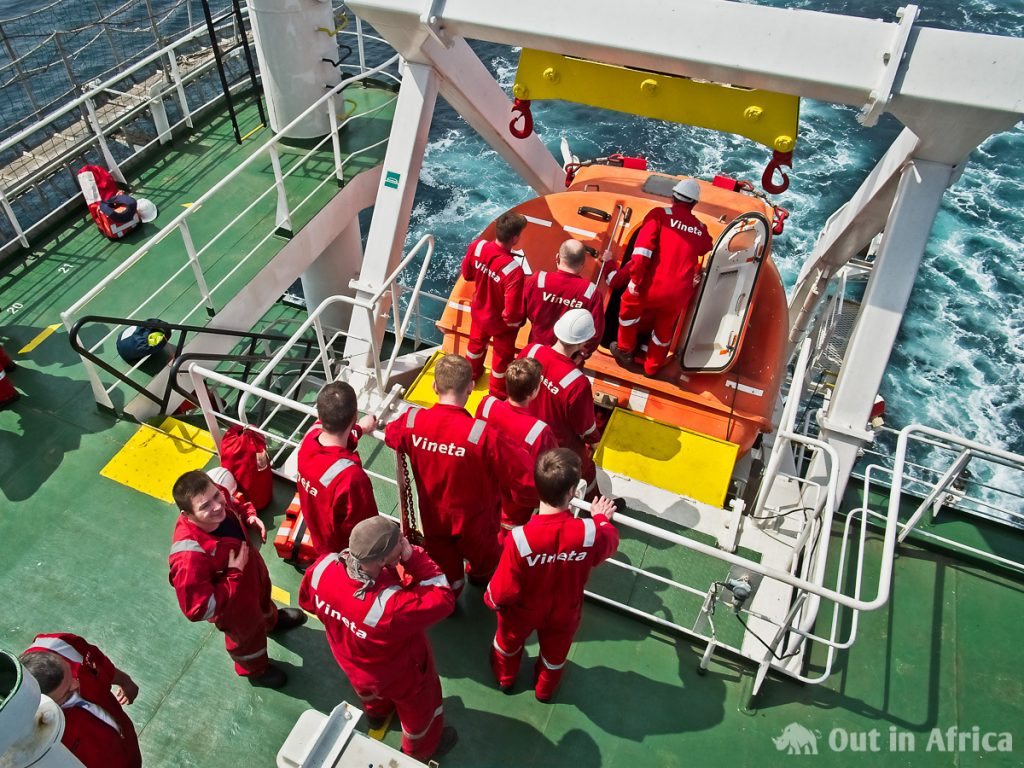
Shortly afterwards the exercise is over. Everyone is allowed to leave. I again walk to the bow of the ship and shoot some flying fish. Since the sun is still shining from the sky, I make a cap out of my pirate Palestinian scarf.
Shortly before 18:00 I leave the balcony again. The big barbecue is next on the agenda.
The boy with the harmonica
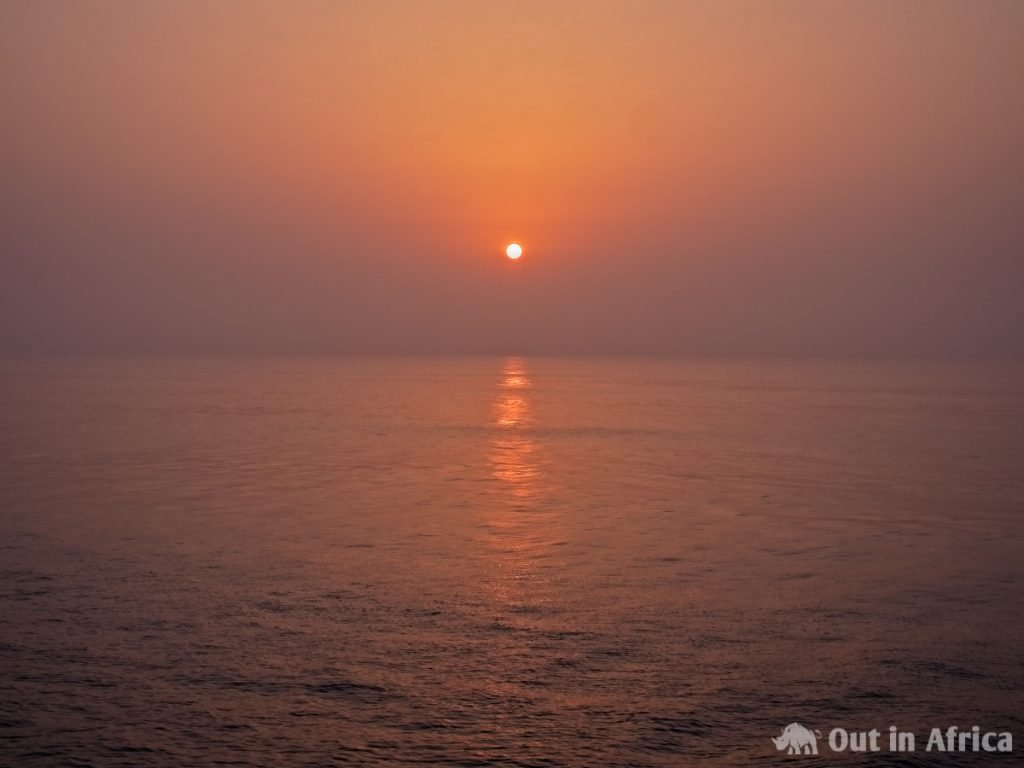
“At home I am God”, Pierre says to me. He has already said it several times.
Pierre has also refilled his wine glass several times
Maybe I misunderstood him completely. I have already had two glasses of Polish vodka. And one beer and one (or were they two?) glass of wine.
Besides, the music is quite loud and all men talk at high volume to be understood with the music.
I most likely misunderstood Pierre.
We’re all pretty drunk. That’s how it is when you’re travelling with Polish seamen. They drink vodka or cognac from water glasses.
I also drank vodka from a water glass, but one or at most two fingers high at a time. So they weren’t full glasses like those of the Polish sailors. They told me “You say when to stop” when they poured vodka into my glass. With one finger I said “Stop! There was one more swig, but that’s okay, I reckoned with it, it was calculated in.
At the end of the evening I have a young Polish sailor in my arms. He could be my son. He is at most 20 years old. “I don’t understand,” he says to me several times. And: “I understand everything.” You don’t have to understand that. And we understand each other. He has drunk more vodka than I have.
He’s trying to tell me something.
“You understand?” he asks me. I don’t really know what he wants to tell me, but somehow I understand him.
“You make beautiful music”, I tell him. He really does.
He plays the harmonica. Not overbearing. He improvises to the music that is playing. All evening long we listen to the music of the captain from a system that is right next to the door to the deck. The captain is the same age group as I am, which means he plays the music of my generation. The best music. The young sailor is a generation younger, but he gives the music his own touch with the harmonica.
He is happy that I say that he makes beautiful music. We hug each other heartily.
You don’t have to understand that now. We are all quite drunk.
At the beginning of the evening we were still all shy with each other. For the first time during the journey, all the people travelling on this ship are sitting at the same table. So far, the officers and passengers have eaten in the officers’ mess, the rest of the crew in another room. Somehow in between were the cook and Robert, the steward.
So far I’ve mostly seen the officers and engineers. I met the other seamen from time to time on the deck. We always greeted each other friendly, but that was all contact we had with each other.
Tonight’s the barbecue. Everyone has been looking forward to it for days. We are sitting outside on deck D. During the week the cook has prepared this evening. There are lots of meat, potatoes in aluminium foil, salads, rolls. To drink we have wine, beer, vodka and cognac. Lots of vodka and cognac.
Poles drink vodka from water glasses. And they drink like water. From full glasses.
I sponsored a case of beer, Pierre in a few bottles of vodka. That goes over well with the sailors. They drink to us. Since it’ s Pierre’s birthday next week, they sing a song from the heart. It’s Polish, but I understand it anyway. I ask the Third Officer sitting next to me if the song says something like “Long shall he live! He says yes.
There are bowls over bowls of meat: beef steak, shashlik, veal steaks, pork neck steaks.
The sailors barbecue their own meat. We sit at a large square table. Six people sit on each side. These groups of six get up in turn, go to half an oil barrel that has been converted into a charcoal grill, and put on whatever they want. When they are finished, the next group goes. Only the captain and we guests don’t have to barbecue ourselves. I notice that when I also go to the fireplace. I am stopped by the cook and asked what I would like to have. Rump steak and shashlik. How would I like my steak? Medium. All okay. He will prepare it for me. Shortly afterwards Robert brings me my meat. It’s perfect. I add half a baked potato and lots of salad. Later I get a veal steak and another potato.
I hadn’ t drunk much at that time. But I love the cook. And Robert.
Pierre has already drunk several glasses of wine and tells me that he was able to fulfil many of his dreams. The song of the sailors, who wished him a long life, made him ponder. If he were to drop dead today, he says, he could claim that he had a fulfilled life. I agree with him. Pierre had a great life. But he will have many more years to fulfill a few more dreams. That’s what the sailors wished him in the song and that’s what I wish him.
After the fifth or sixth wine, Pierre tells me that he is God at home. But perhaps I misunderstood him. I had got up and gone to the other end of the table and asked the second engineer to put vodka in my water glass. “You say when to stop.” I want a finger wide and get two. That’ s fine.
From now on, I’m part of the crew. After all, I drink vodka from a water glass. They toast me. We are best friends.
In between we make several La Ola waves around the table. Of course I join in. Pierre and the captain too.
I’m scrounging a cigarette from a sailor. Pierre is horrified. “You smoke?” he asks. “One cigarette a year”, I answer. At the end of the evening it was two. The sailor from whom I get the cigarettes says that I could always come to him if I wanted to smoke one. I thank him, but say that I only smoke one cigarette a year.
The bald sailor, who always walks around with a headscarf, gets up and dances to the music. When he raises his arms in rhythm, his shirt pulls up and his navel peers out. He doesn’t care. He is among his friends and colleagues and he wants to dance. The young sailor with the harmonica improvises to music. We all clap to the rhythm.
I get another vodka. Robert gives it to me (two fingers high) and asks if I also want Coke or Fanta. No, I want my vodka pure. Wow! The sailors are impressed.
“Nastrowija!” we all shout. The word is pronounced a little differently than in Russian. The captain says that I pronounce it perfectly.
We’re out of vodka. Suddenly full bottles magically appear on the table. That is how it is with the Poles.
I love them all, these Polish sailors.
Maybe I drank too much vodka, wine and beer after all. I switch to water.
Pierre tells me again the story of his life, says that he had a fulfilled life and that he is God at home.
The sailor I scrounged the cigarettes from tells me about his wife. His English is very simple, he lacks words and at some point he just looks sad, drinks his vodka and smokes another cigarette. He misses his wife.
Pierre doesn’t say much anymore, neither about his life, nor that he is God in his own home.
And I certainly misunderstood about God, after two fingers wide vodka. So almost a water glass full.
Shortly afterwards Pierre gets up and goes to bed. He even leaves an almost full wine glass.
I get myself another vodka and shortly afterwards I have the young sailor sitting next to me. The one with the harmonica. He tells me in English that he doesn’t understand anything and understands everything and I say that I understand him and that he makes beautiful music. He hugs me and kisses my hand. He reminds me a bit of my nephews, whom I love very much, and of a hobbit.
Now and then the captain says to me that if the young man gets too pushy for me, I only have to say something. I say that everything is fine. I cope okay.
It is at this moment that I noticed that everyone had drunk quite a lot of alcohol, but that everything is still under control. The Bosun, the direct superior of the young man, looks over watchfully. The Chief Engineer and the Captain also take care that nothing gets out of hand. I feel very safe. And I’m having fun.
Then I decide to go to bed. I am so exhausted!
Would you like to see an overview of all articles about my journey on the cargo ship Bright Sky? Click here for a table of contents.
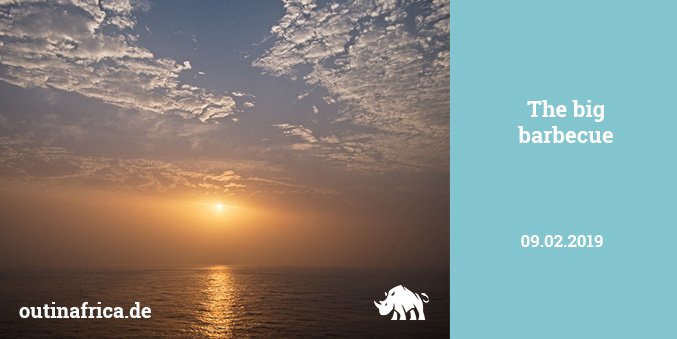
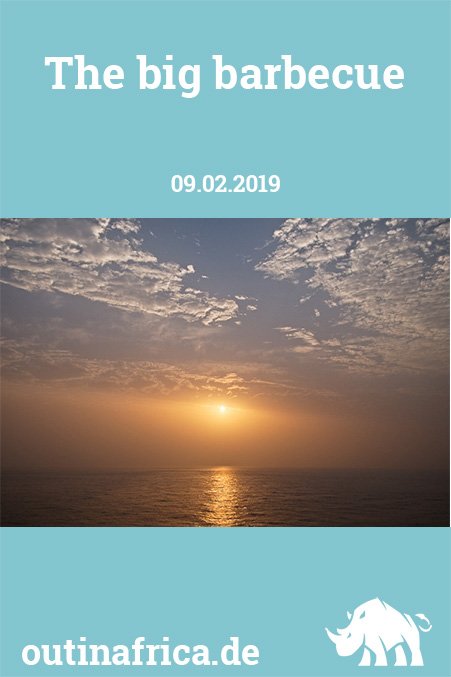

Leave a Reply